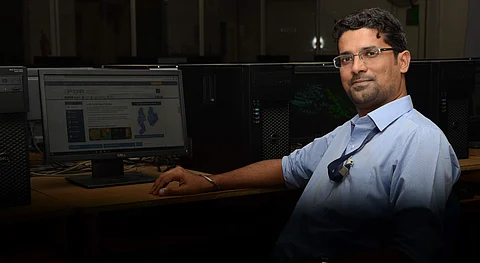

Computers and chemicals don’t go hand-in-hand. Or do they? Ask P R Naren, a senior assistant professor at SASTRA University and he’ll tell you otherwise. He upgraded the Chemical Engineering course at the university by developing a course on Computer Applications in Chemical Engineering.
And not just that, this 35-year-old also promotes the use of free and open-source tools such as Scilab, OpenModelica, DWSIM and OpenFOAM for education.
We caught up with Naren a while ago, and he had a lot to share about his journey as a professor.
Excerpts:
What prompted you to take up teaching?
Teaching was more of a choice than by chance for me. I remember an incident in class X, when my chemistry teacher asked me to take a class on radioactive rays as part of an assignment. I was thrilled to stand in front of my classmates and explain the concepts.
Having benefitted from good teachers all through my education, I wanted to strive to do some good in return.
Are there any challenges that you’ve faced?
One big challenge that I face is trying to get students to appreciate the acquisition of knowledge rather than the acquisition of grades. It’s quite complicated.
At adolescence, it is difficult to make a student understand the value of knowledge, given that our society weighs and grades everyone in terms of marks, ranks and numbers.
Hopefully, sometime in the near future, I can bring out constructive suggestions to overcome this challenge.
Tell us your teaching success mantra!
First, I ensure that the evaluation of answer papers is completely transparent. I either email or upload the answer key for monthly exams to the students and inform them where they have gone wrong.
Also, I am firm on my attendance policy, submission of assignments and so on. But those are never related to their grades or performance.
I always encourage them to send me messages and emails if they have any queries, and respond to these on time without delay.
How do you maintain a good relationship with your students?
I always tell my students that I will be friendly with them but I won’t be their friend. They know me as a professor who will offer them tea when we meet at the canteen, but at the same time, they know that I will not hesitate to score their papers strictly.
At the beginning and end of every lecture, I spend about two minutes in ice-breaking sessions.
Could you tell us about the free open-source software tools that you use?
When I joined SASTRA in August 2011, the head of the department, Dr R Kumaresan wanted me to develop a course on Computer Applications in Chemical Engineering (CAChE). This was quite unusual. I developed the course curriculum and that required a programming tool. It was in this context that I opted to use Scilab, a free open-source tool.
This was very much welcomed by the University Academic Council. After the successful introduction of CAChE utilising Scilab, I got to professionally connect with Prof Kannan Moudgalya of IIT-Bombay, who is spearheading the cause of free open-source tools in education through the FOSSEE programme, funded by NMEICT, MHRD.
